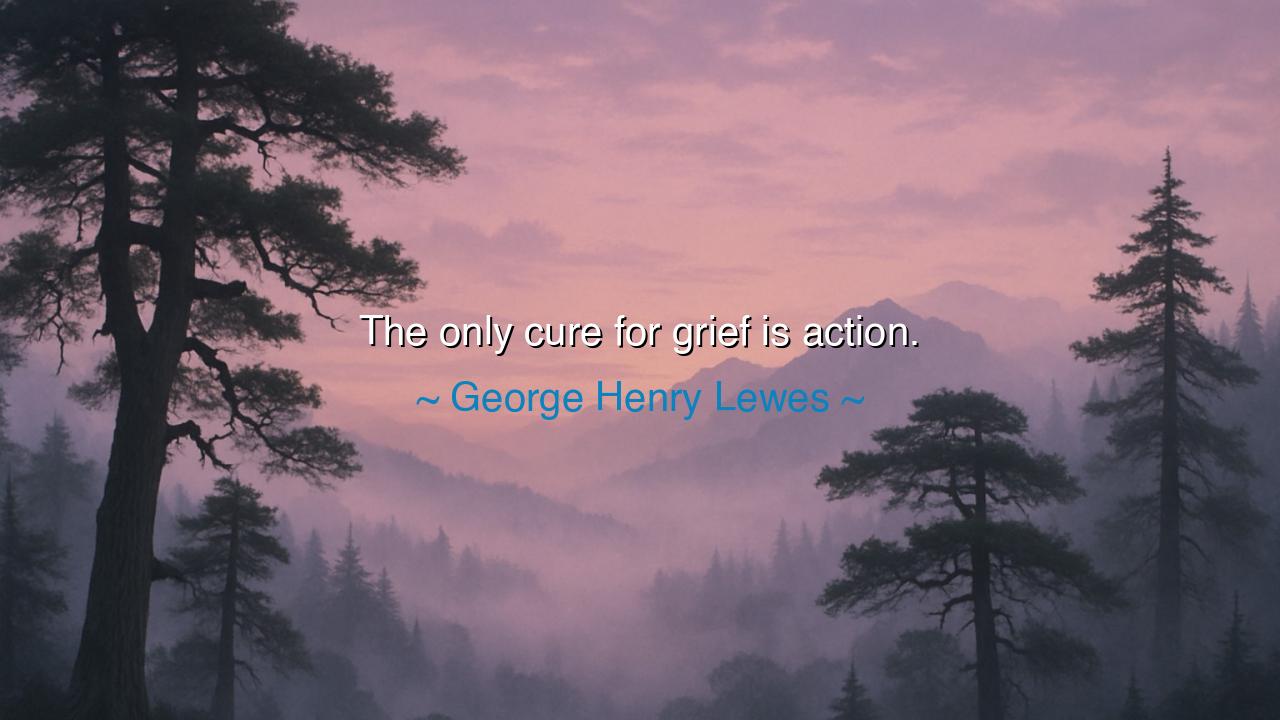
The only cure for grief is action.






Hear the words of George Henry Lewes, philosopher and man of letters, who declared: “The only cure for grief is action.” In this phrase there is no soft comfort, no promise that sorrow will melt away with the passing of days. Instead, Lewes offers a stern and heroic truth: grief cannot be dissolved by waiting or by idle lamentation. It is too heavy, too consuming. Only through movement, through deeds, through turning sorrow into labor or service, can the soul find a path to healing.
The meaning of this saying lies in the nature of grief itself. When loss pierces the heart—whether the loss of a loved one, of hope, or of purpose—it tempts us to paralysis. The mourner may sit in stillness, consumed by memory, unable to rise. Yet grief left unchecked becomes poison; it eats away at strength, leaving only despair. Action, however humble, begins to break this paralysis. By tending to others, by working with one’s hands, by devoting energy to some cause, the grieving heart reawakens. Movement is life’s defiance of death.
History gives us many mirrors of this truth. Consider Florence Nightingale during the Crimean War. Surrounded by the endless grief of dying soldiers, she could have collapsed beneath the sorrow. Yet instead, she turned anguish into action: walking the wards by night, carrying her lamp, tending to the sick. It was through her deeds that she found strength, and through her deeds that others were saved. For her, grief was not erased—it was transformed into compassion and labor.
The same truth can be found in the life of Abraham Lincoln. His heart bore profound grief, from the death of his children to the endless losses of the Civil War. Yet he did not allow despair to consume him. He threw himself into the action of preserving the Union, of seeking words to comfort the bereaved, of working tirelessly for reconciliation. His sorrow became fuel for endurance, his anguish a wellspring of resolve. Thus Lewes’ words ring true: grief demanded action, and action gave meaning to grief.
This wisdom also resonates with the ancients. The Stoics, who pondered the weight of human suffering, taught that one cannot control fate, but one can control their response. To mourn endlessly is to submit to fate’s cruelty; to act is to reclaim dignity. The warrior who loses a comrade honors them not with endless tears, but by rising again to fight. The parent who loses a child honors them by caring for the living. In every age, the answer to grief has been the same: do something, move forward, live so that love and loss are not wasted.
The lesson is clear: when grief comes, do not expect time alone to heal you. Instead, seek action. Channel your sorrow into tasks, whether noble or simple. Help the poor, plant a tree, write a letter, build something with your hands, or walk beside another who suffers. The doing itself will not erase your pain, but it will carry you forward, step by step, into a life where the wound is no longer the master of your soul.
So, children of tomorrow, engrave this upon your hearts: grief will come to you, as it comes to all. When it does, rise. Do not let it chain you to stillness. Honor what you have lost by living, by working, by loving anew. For as George Henry Lewes declared, “The only cure for grief is action.” And in action lies not the forgetting of sorrow, but its transformation into strength, purpose, and the continuation of life’s great journey.






AAdministratorAdministrator
Welcome, honored guests. Please leave a comment, we will respond soon